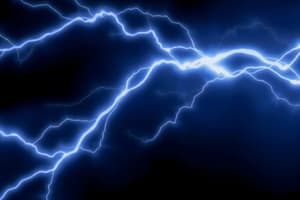Podcast
Questions and Answers
What does the word 'electricity' refer to in physics?
What does the word 'electricity' refer to in physics?
- The production of static electricity
- The flow of water in hydroelectric power plants
- Electrical energy and the movement of charge (correct)
- The generation of lightning storms
What did Benjamin Franklin decide about the nature of electricity in the mid 1700s?
What did Benjamin Franklin decide about the nature of electricity in the mid 1700s?
- Electricity is a form of energy that cannot be harnessed
- An excess of electricity is positive and a deficit of electricity is negative (correct)
- Electricity has no particular direction of flow
- Electricity is a result of the movement of protons
What is the SI unit for electric current?
What is the SI unit for electric current?
- Volts (V)
- Watts (W)
- Ohms (Ω)
- Amperes (A) (correct)
What is the movement of charge known as in physics?
What is the movement of charge known as in physics?
What assumption about the direction of electric current was made by Benjamin Franklin?
What assumption about the direction of electric current was made by Benjamin Franklin?
Flashcards are hidden until you start studying
Study Notes
Definition of Electricity
- Refers to the physical phenomena associated with the presence and movement of electric charge.
- Includes various effects such as lightning, static electricity, and the operation of electrical devices.
Benjamin Franklin's Contribution
- Conducted experiments in the mid-1700s to explore the nature of electricity.
- Proposed that electricity consisted of two types of charges: positive and negative.
- Suggested that lightning is a form of electrical discharge.
SI Unit of Electric Current
- The standard unit is the ampere (A).
- Represents the flow of electric charge and indicates how much charge passes through a conductor in a given time.
Movement of Charge
- Known as electric current.
- Involves the flow of electrons or other charged particles through a medium.
Assumption by Benjamin Franklin
- Assumed that electric current flows from positive to negative.
- This assumption established the conventional current direction, which is still used in circuit analysis today.
Studying That Suits You
Use AI to generate personalized quizzes and flashcards to suit your learning preferences.




